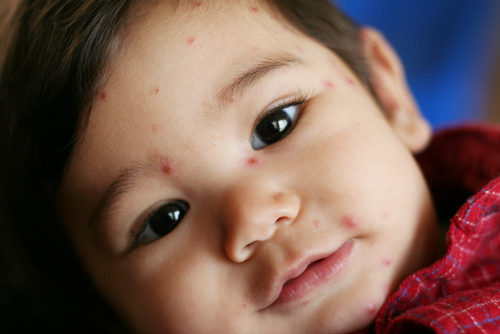
Photo: Shutterstock
Chickenpox is a well-known, contagious disease that many people will recognise because of the distinct skin rash that it causes. For those who are not familiar with it, the rash occurs in the form of tiny, red blisters that itch. The disease is caused by a virus called the varicella-zoster virus (VZV). It can affect people of all ages and can be quite severe when experienced by infants, adults and those who have compromised immunity. Because it is an airborne disease, chickenpox spreads through coughing and sneezing. It also infects others if they come into contact with the virus due to close proximity with the chickenpox blisters.
Symptoms and detection
Chickenpox is nearly always diagnosed based on the symptoms that infected persons exhibit. The most characteristic symptom of chickenpox is a rash that develops on the face, chest, back and then all over the body. The rash usually develops into itchy blisters filled with fluid. The blisters then turn into scabs after about a week, before healing. The disease lasts for about five to ten days and other symptoms include:
- High fever
- Fatigue
- Appetite loss
- Headaches
Even people who have had the chickenpox vaccine are not fully protected from the virus and can still catch the disease. Usually though, they experience milder symptoms.
Treatment
There is no cure for chickenpox. However, there are ways in which you can help alleviate its uncomfortable symptoms and soothe itchy skin. Many people recommend using oatmeal, either as a paste or a bath to soak in if that is an option. A small branch of a neem tree can also be used to lightly fan the patient. Letting the leaves gently touch the skin can help with the itchiness. Avoiding scratching and keeping fingernails short can also prevent further skin aggravation and infections.
Although fever medication can be used, aspirin should never be used as it can cause severe complications, especially in children. Check with your doctor about which medication is best to deal with a fever caused by chickenpox. Sometimes, antiviral medications are also suggested to those with the disease who are at risk of developing more severe illness. Consult your doctor to see whether you fit this profile. This includes if you have not had chickenpox before, if your immunity is low due to disease or any other reason, the patient is older than 12 years old and if you are pregnant. Other symptoms that suggest you need more medical attention include fever for more than four days, a fever above 102°F (38.9°C), bacterial infections noticed because of puss, constant vomiting, difficulty breathing and other signs of serious illness.
Prevention
The most effective method of preventing chickenpox is by getting a vaccine. The Indian Academy of Pediatricians recommends two doses, starting with the first at 15-18 months with a follow-up between 4-6 years. However, catch-up vaccines can be administered at any time. The varicella vaccination can prevent the disease developing in most cases. If the disease does strike a vaccinated individual, he/she usually suffers from milder symptoms. The vaccine also ensures almost total prevention from developing complications due to chickenpox, and it can prevent shingles, a painful skin condition, later on in life. If you have not been vaccinated and are exposed to the virus, consult your doctor on what course of action to take.
Share your thoughts, leave a comment below. Please like FamiLife’s page on Facebook so that you get all our articles and others may find us.
